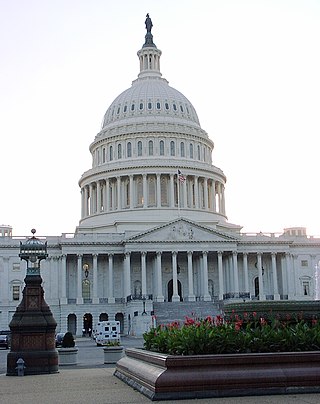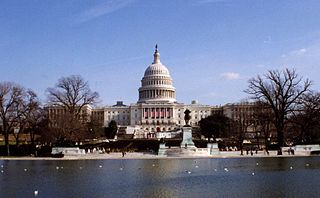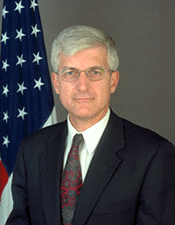The United States order of precedence is an advisory document maintained by the Ceremonials Division of the Office of the Chief of Protocol of the United States which lists the ceremonial order, or relative preeminence, for domestic and foreign government officials at diplomatic, ceremonial, and social events within the United States and abroad. The list is used to mitigate miscommunication and embarrassment in diplomacy, and offer a distinct and concrete spectrum of preeminence for ceremonies. Often the document is used to advise diplomatic and ceremonial event planners on seating charts and order of introduction. Former presidents, vice presidents, first ladies, second ladies, and secretaries of state and retired Supreme Court justices are also included in the list.

The 108th United States Congress was a meeting of the legislative branch of the United States federal government, composed of the United States Senate and the United States House of Representatives from January 3, 2003, to January 3, 2005, during the third and fourth years of George W. Bush's presidency.

The 106th United States Congress was a meeting of the legislative branch of the United States federal government, composed of the United States Senate and the United States House of Representatives. It met in Washington, D.C., from January 3, 1999, to January 3, 2001, during the last two years of Bill Clinton's presidency. The apportionment of seats in the House of Representatives was based on the 1990 United States census. Both chambers maintained a Republican majority.

The 103rd United States Congress was a meeting of the legislative branch of the United States federal government, composed of the United States Senate and the United States House of Representatives. It met in Washington, D.C. from January 3, 1993, to January 3, 1995, during the final weeks of George H. W. Bush's presidency and in the first two years of Bill Clinton's presidency. The apportionment of seats in the House of Representatives was based on the 1990 United States census.

The 99th United States Congress was a meeting of the legislative branch of the United States federal government, composed of the United States Senate and the United States House of Representatives. It met in Washington, D.C., from January 3, 1985, to January 3, 1987, during the fifth and sixth years of Ronald Reagan's presidency. The apportionment of seats in the House of Representatives was based on the 1980 United States census.

The Bureau of Oceans and International Environmental and Scientific Affairs (OES) is a functional bureau within the United States Department of State. The Assistant Secretary of State for Oceans and International Environmental and Scientific Affairs coordinates a suite of portfolios related to oceans, environmental, polar, scientific, fisheries, wildlife, conservation, and natural resource and health affairs that affect U.S. foreign policy interests. The Assistant Secretary reports to the Under Secretary of State for Economic Growth, Energy, and the Environment.

The 110th United States Congress was a meeting of the legislative branch of the United States federal government, between January 3, 2007, and January 3, 2009, during the last two years of the Presidency of George W. Bush. It was composed of the Senate and the House of Representatives. The apportionment of seats in the House was based on the 2000 U.S. census.

The Office of the Secretary of Defense (OSD) is a headquarters-level staff of the United States Department of Defense. It is the principal civilian staff element of the U.S. Secretary of Defense, and it assists the Secretary in carrying out authority, direction and control of the Department of Defense in the exercise of policy development, planning, resource management, fiscal, and program evaluation responsibilities. OSD is the Secretary of Defense's support staff for managing the Department of Defense, and it corresponds to what the Executive Office of the President of the U.S. is to the U.S. president for managing the whole of the Executive branch of the federal government.
Assistant Secretary of State (A/S) is a title used for many executive positions in the United States Department of State, ranking below the under secretaries. A set of six assistant secretaries reporting to the under secretary for political affairs manage diplomatic missions within their designated geographic regions, plus one assistant secretary dealing with international organizations and one equivalent as the coordinator/ambassador at large for counterterrorism. Assistant secretaries usually manage individual bureaus of the Department of State. When the manager of a bureau or another agency holds a title other than assistant secretary, such as "director", it can be said to be of "assistant secretary equivalent rank". Assistant secretaries typically have a set of deputies, referred to as deputy assistant secretaries (DAS).

The School of International and Public Affairs (SIPA) is the international affairs and public policy school of Columbia University, a private Ivy League university located in Morningside Heights, Manhattan, New York City. SIPA offers Master of International Affairs (MIA) and Master of Public Administration (MPA) degrees in a range of fields, as well as the Executive MPA and PhD program in Sustainable Development.
Executive Schedule is the system of salaries given to the highest-ranked appointed officials in the executive branch of the U.S. government. The president of the United States appoints individuals to these positions, most with the advice and consent of the United States Senate. They include members of the president's Cabinet, several top-ranking officials of each executive department, the directors of some of the more prominent departmental and independent agencies, and several members of the Executive Office of the President.

The Under Secretary of Agriculture for Farm and Foreign Agricultural Services was the third-ranking official in the United States Department of Agriculture prior to reorganization of several mission areas, announced on May 11, 2017. The mission area of USDA's purpose was to "help to keep America's farmers and ranchers in business as they face the uncertainties of weather and markets..." and that "...deliver[s] commodity, credit, conservation, disaster, and emergency assistance programs that help improve the stability and strength of the agricultural economy." The Under Secretary was traditionally appointed to serve as the President of the Commodity Credit Corporation.

Alan Philip Larson is a diplomat and a former United States Ambassador to the Organisation for Economic Co-operation and Development (OECD) in 1990–93. From 1996 to 1999, he served as U.S. Department of State Assistant Secretary for Economic and Business Affairs. In 1999 to 2005, he also served as US Undersecretary of State for Economic, Business, and Agricultural Affairs, OECD. He is a United States Career Ambassador, and a recipient of the Secretary of State’s Distinguished Service Award.

The Quadrennial Diplomacy and Development Review (QDDR) is a study by the United States Department of State, conducted beginning in 2009 and intended to be done every four years, that analyzes the short-, medium-, and long-term blueprint for the United States' diplomatic and development efforts abroad. It seeks to plan on a longer-term basis than the usual year-to-year, appropriations-based practice, and to integrate diplomacy and development missions. It similarly seeks to correlate the department’s missions with its capacities and identify shortfalls in resourcing. Finally, it is a precursor to core institutional reforms and corrective changes. The first review was completed by the end of 2010. A second review began during 2014 and was released in April 2015. No further reviews have taken place.

Jose W. Fernandez is a Cuban-American attorney and diplomat currently serving as the Under Secretary of State for Economic Growth, Energy, and the Environment. Fernandez previously served as the Assistant Secretary of State for Economic, Energy, and Business Affairs from 2009 to 2013.

The Ministry of Economic Affairs and Climate Policy is the Netherlands' ministry responsible for international trade, commercial, industrial, investment, technology, energy, nuclear, renewable energy, environmental, climate change, natural resource, mining, space policy, as well as tourism.

















